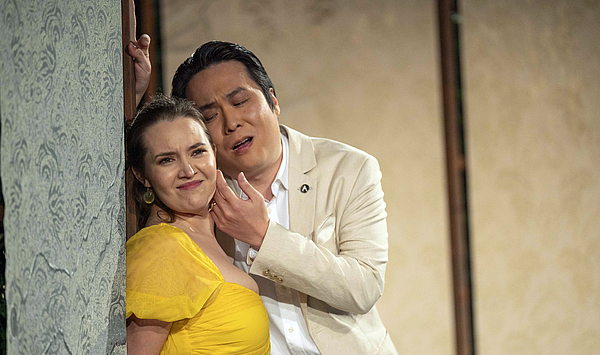
Confusion with great emotions
Mozart's opera "Le nozze di Figaro" four times on the stage of the Belvedere Studio Theatre
The premiere critics praised the singing students for their performance in Saalfeld with "humour and enthusiasm". Now Wolfgang Amadeus Mozart's popular comic opera "Le nozze di Figaro" ("Figaro's Wedding") is also coming to Weimar: the opera production celebrates its premiere on Friday, 26 April at 6:30 p.m. in the Belvedere Studio Theatre. In this second performance cycle, the orchestra of the University of Music FRANZ LISZT Weimar will perform under the direction of Prof Ekhart Wycik. Mozart's "opera buffa" in four acts will also be performed here in Italian.
Previously, there had been successful performances at the Meininger Hof in Saalfeld in February. Andrea Raabe is directing this collaboration between Rudolstadt Theatre and the University of Music FRANZ LISZT Weimar. The stage and costumes were designed by Ronald Winter. Students from the Department of Vocal Studies | Music Theatre at the Weimar Music university will be singing.
Further Weimar performances will follow on Sunday, 28 April at 4:00 p.m., on 3 May at 6:30 p.m. and on 5 May at 4:00 p.m. in the Belvedere Studio Theatre.
Tickets for the studio theatre are available in advance from the Weimar Tourist Information Office and at the box office for 15 euros (reduced price 10 euros).
"Le nozze di Figaro" thrives on the joy of deception and intrigue, hide-and-seek and rebellion against the social order, but also on great emotions. The action takes place in Seville shortly before the French Revolution. Count Almaviva has long since grown weary of his love for his wife. Instead, he has recently taken a fancy to her young maid Susanna.
Even on the day of her wedding to Figaro, he does not refrain from his advances and claims the "right of the first night" for himself. Susanna, however, is anything but enthusiastic about the count and his plans and, together with the deceived countess, hatches a plan to deceive the lustful nobleman.
Librettist Lorenzo da Ponte retains the complex confusion of Beaumarchais' frivolous and highly political original "The Fancy Day or Figaro's Wedding" and yet creates space for special aria moments and lively ensemble scenes. Mozart endows the characters with a multi-layered emotional world that unfolds before the audience in his colourful music. Musical humour and depth of heart go hand in hand in this opera.
[8 April 2024]
